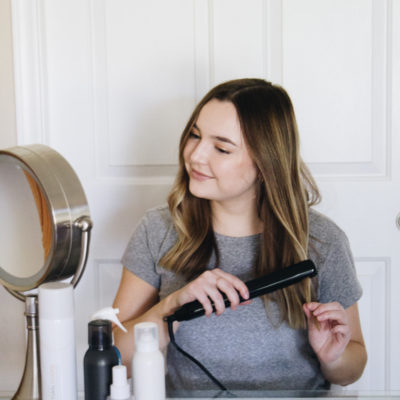Advice from a 30 Something: How I Wish I Managed My Finances in My 20s
posted on November 12, 2015 | by Amanda Holstein

It’s about time we got some advice from an experienced and successful thirty-something, don’t you think? I do my best, but there’s only so much a twenty-something can offer another twenty-something. So I’m excited to introduce you to Erin Hiemstra of Apartment 34. She’ll be sharing her worldly, thirty-something advice with us every now and then, keeping us in the loop on what to expect in this next phase of life! Today seriously gave me a wake up call when it comes to managing my finances in my 20s. Take a look!
//
Thinking about money and financial planning can be a daunting thing – no matter your age or stage in life. But getting your arms around your financial goals early is only going to help you. While I would never claim to be any sort of financial expert, and I’ve long left my 20’s behind, there are a few lessons I feel are worth imparting!
Save Early, Save Consistently
Everyone knows the cliché of saving for a rainy day, but it really is all too true. You just never know what could befall you. A lost job {happened to me}, a smashed car {happened to me} or a sudden increase in your rent {happened to me!}. If you begin setting aside a consistent portion of your pay for a rainy day fund, you won’t be caught begging your family for a bail out. The general recommendation is 5% of your base pay. If you can, get your employer to send that portion of your check to a separate account – then you’ll never even miss it!
Think About the Long Term
I realize it can be nearly impossible to think about retirement when you’re just starting your career, but starting a retirement account from the outset will only set you up for long-term success. So many companies offer 401(k) benefits these days. If you don’t take advantage of them you’re literally leaving free money on the table. If you’re 25, you need to invest only about $3,600 per year to end up with $1 million by the time you’re 65 if your investments return 8 percent per year. And if my parents current experience is any indication, retirement is grand. You want to be able to enjoy it!
Avoid Those Store Credit Cards
You know the drill. You walk into [insert name of any major store here] and they offer you 20% off your purchase if you sign up for that pre-approved store credit card today! I realize it’s tempting. You want to save on a big purchase. But what they don’t tell you is the massive interest rate {like 25%} that often accompanies a company credit card. Having multiple credit accounts also impacts your credit score. And your credit score comes into play more often then you think – when applying for a new lease, trying to buy a car or if you eventually want to buy a house!
Fewer/Better
The impulse buy is quite the temptress. It can be so easy to pop a must have onto a credit card with the plan to curb your spending next month. Or next month. Or next month. Be it an amass of the latest Zara collection or that pair of Dior boots that you just have to have, shoving yourself into debt is just never worth it. Eventually push will come to shove and you will have to dig your way out. It can be painful and if not careful it can be almost impossible. So instead, buy fewer. Buy better. I always say buy the very best that you can afford. If you can stay out of debt in your 20s, your 30-year-old self will thank you!
Head on over to Apartment 34 to check out my beauty advice,
and stay tuned for more ridiculously helpful advice from a 30 something!
 Using Trunk Club to Update My Spring/Summer Wardrobe
Using Trunk Club to Update My Spring/Summer Wardrobe 5 Tips For Styling a Simple Summer Dress
5 Tips For Styling a Simple Summer Dress 5 Ways to Style a Bandana
5 Ways to Style a Bandana 3 Different Ways to Curl Your Hair
3 Different Ways to Curl Your Hair How to Master the 5-Minute Makeup Routine
How to Master the 5-Minute Makeup Routine Amazon Beauty Buys Under $25
Amazon Beauty Buys Under $25 3 Ways to Make Your next Trip More Memorable
3 Ways to Make Your next Trip More Memorable Tips for Digital Spring Cleaning and Organizing
Tips for Digital Spring Cleaning and Organizing Color Trend: Marigold
Color Trend: Marigold Mental Health Update: The 3 Major Changes I Made to Get Out of Depression
Mental Health Update: The 3 Major Changes I Made to Get Out of Depression 5 Unexpected Ways to Unwind After Work
5 Unexpected Ways to Unwind After Work How to Know You’re in a Controlling Relationship
How to Know You’re in a Controlling Relationship 4 Questions I get Asked as a Professional Resume Writer
4 Questions I get Asked as a Professional Resume Writer How to Make Friends at Work
How to Make Friends at Work Getting Out of the ‘Busy’ Mindset
Getting Out of the ‘Busy’ Mindset Ask Amanda: How do I pursue the career I want without formal training?
Ask Amanda: How do I pursue the career I want without formal training? Ask Amanda: How Do I Find a Therapist?
Ask Amanda: How Do I Find a Therapist? Ask Amanda: How do I stop being jealous in my relationship?
Ask Amanda: How do I stop being jealous in my relationship?





London Management Centre Says
Agree with the credit cards. Those should be renamed the devil’s cards. Can spend, spend, spend and not realise how much you have actually spent!!
Adam Says
Life brings us many obstacles and it is important that in any case you have a certain amount of money. It is never too late to learn how to keep track of money and increase it. You can start investing online right now, from anywhere in the world, I advise you to learn more about it here uspesnynaburze.sk
CharlesKenney Says
In my 20s, I wish I’d managed my finances with more foresight, especially when it came to horse racing betting. Back then, the thrill of a win overshadowed the importance of setting boundaries. I often bet impulsively, treating it as easy entertainment without considering its impact on my savings. If I could do it again, I’d set strict betting limits, ensuring I only wagered money I could afford to lose. According to my experience, horse racing betting is more enjoyable. Though there is a risk involved. You can win or lose but enjoy for sure. Check out this horse racing betting not on gamstop.
I’d also create a budget prioritizing essentials and long-term savings, leaving room for hobbies like horse racing in moderation. Instead of chasing losses, I’d focus on the excitement of occasional, calculated bets rather than frequent gambling. Additionally, diversifying my financial knowledge and investing in assets rather than fleeting thrills could’ve given me a more stable financial foundation. Looking back, balance and discipline in managing both passions and finances are lessons I wish I’d embraced earlier.